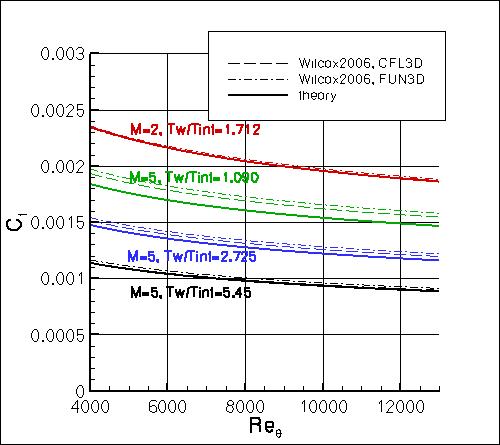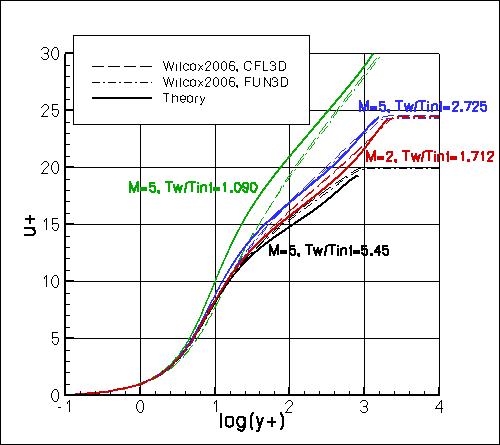 |
Langley Research CenterTurbulence Modeling Resource |
Jump to: SA Results, SST-Vm Results, EASMko2003-S Results, K-e-Rt Results
Return to: High Mach Number Flat Plate Validation Intro Page
Return to: Turbulence Modeling Resource Home Page
2D Zero Pressure Gradient High Mach Number Flat Plate Validation Case
Wilcox2006-klim-m Model Results
Link to Wilcox2006-klim-m equations
Previously on this page the results were reported as Wilcox2006-klim solutions, but more properly they
should be referred to as Wilcox2006-klim-m. As discussed below, only relatively minor effects are expected.
Note that thorough
grid studies were not performed for validation cases such as this one.
Some effort was made to ensure reasonable grid resolutions, but there may still be
small noticeable discretization errors. Therefore, these validation results shown should be considered
representative, but not "truth."
Above Wilcox2006-klim-m results are from CFL3D and FUN3D on the 545x385 grid.
Both CFL3D and FUN3D used freestream turbulence intensity=0.004% (M=2) and 0.002% (M=5) and freestream turbulent viscosity (relative to laminar)=0.009
(additional details can be found in the CFL3D User's Manual, Appendix H).
Please read note 5 on Notes on running CFD page.
Results are very similar between the two codes.
The right-hand plot is extracted from the location where Retheta=10000.
Note that these are
compressible code results using no compressibility corrections.
Furthermore, as for other two-equation model cases posted on the TMR website, the
Note that this model is currently assigned
MRR Level 2 for the purposes of this website.
This is because at this time the TMBWG has results for this model
from two different codes from the same home organization.
The results on this page are therefore not necessarily
reliable until additional independent code(s) can be used to verify the model implementation.
Jump to: SA Results,
SST-Vm Results,
EASMko2003-S Results,
K-e-Rt Results Return to: High Mach Number Flat Plate Validation Intro Page Return to: Turbulence Modeling Resource Home Page
Responsible NASA Official:
Ethan Vogel


 term in the production was ignored (often the default for codes whose predominant applications are low-speed
or transonic cases).
Generally speaking, for high-speed cases, this term could be significant.
However, testing for the 2DZPH case with the SST-Vm model
has shown that including
or ignoring this term only makes relatively minor differences
(on the order of the differences seen between the codes).
A typical FUN3D input file is:
fun3d.nml_typical_w06_m5t1p09.
term in the production was ignored (often the default for codes whose predominant applications are low-speed
or transonic cases).
Generally speaking, for high-speed cases, this term could be significant.
However, testing for the 2DZPH case with the SST-Vm model
has shown that including
or ignoring this term only makes relatively minor differences
(on the order of the differences seen between the codes).
A typical FUN3D input file is:
fun3d.nml_typical_w06_m5t1p09.
Page Curator:
Clark Pederson
Last Updated: 03/12/2025